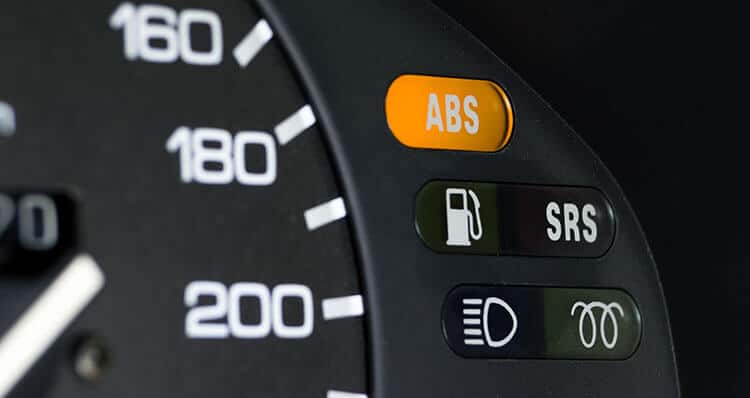Amazing that a tiny icon showing up unannounced on your dashboard can cause such a sinking feeling in your stomach. Somehow you know that those pesky little lights signal no good. And how much more the horror when the warning lamp that just made an appearance relates to the most important safety system on your car: your brakes. What do you do if the ABS light came on in your dashboard display?
What is the ABS light?
The ABS warning light is an icon on a vehicle’s dashboard that alerts the driver to a potential problem with the ABS (Anti-lock Braking System). The ABS on a car, truck, or SUV prevents the wheels from locking up when a driver slams on the brake pedal in an emergency situation or on a wet or slippery surface. By keeping the tires from skidding, the ABS increases friction between the tires and the ground to increase stopping power. And by allowing the wheels to continue to rotate, the ABS allows the driver to maintain control of the steering system. The ABS warning light is a sign that the system might be compromised.
Every time a vehicle is started, the ABS light will come on momentarily as the system does a diagnostic self-check. If the light does not illuminate, the warning lamp bulb could be defective. But under normal conditions the light comes on briefly, along with several other warning lamps, and then turns off. If the ABS light stays on – or if it lights up while you are driving – there is a problem somewhere in the system.
What does the ABS warning light mean?
An ABS warning light that comes on and stays on could signal a problem with various components in and related to the anti-lock brakes. For instance, special sensors monitor the speed of the wheels. If one or more of these wheel speed sensors are inoperative or defective, the ABS warning light will remain on. The same is true if there is a problem with the wiring.
Other potential faults might be with the ABS control module, a defective power relay to the module, a solenoid valve, or the hydraulic pump in the system. The warning light can even come on if a fuse blows or if the brake fluid level is low in the brake master cylinder (or in the ABS reservoir if the vehicle is so equipped).
What do I do if the ABS light stays on?
If you are like most drivers, you will choose to have a repair shop take a look at your vehicle when it shows a problem with the ABS. On the other hand, it may be tempting to try to fix the problem on your own. In fact, if the problem is due to low brake fluid, the repair is simple. Or is it? Not all brake fluids are compatible with one another; it is essential that the proper fluid be installed in a vehicle. Did you know that a container of old and open brake fluid may not be effective? And while replacement of a blown fuse is no difficult task, diagnosing why the fuse may have blown can be.
When it comes to diagnosing an ABS warning light, there are a couple approaches. The warning light on some vehicles will flash a number of times before remaining lit. This series of flashes reveals a diagnostic trouble code, a way of determining where the fault may lie. On other vehicles, it is necessary to perform a diagnostic scan with specialized equipment and knowledge of how to interpret the data from the vehicle’s computer. Once the trouble has been narrowed down with a scan tool (or through the blinking lights), it is necessary to pinpoint the specific cause of the malfunction. Without this level of specificity repairs may not be accurate or complete.
Fortunately, if the ABS warning light came on, and no other warning lights are present, the brakes will still work. Just like they would on a car without ABS. But the ABS will not function and will not prevent the wheels from locking up in an emergency or on a slippery road. And any systems related to ABS components – the traction control system and stability control system for instance – may not function either. And if there are other warning lights on, there might actually be a problem with the general braking system – a sign that the vehicle should not be driven.
So, if you want to relieve the pit in the bottom of your stomach, leave diagnosis and repair of your car’s ABS to the professionals. Make sure to have a qualified technician inspect and evaluate the cause of what turned your ABS light on.
Columbia Auto Care & Car Wash | Author: Mike Ales | Copyright
This article is intended only as a general guidance document and relying on its material is at your sole risk. By using this general guidance document, you agree to defend, indemnify and hold harmless Columbia Auto Care & Car Wash and its affiliates from and against any and all claims, damages, costs and expenses, including attorneys’ fees, arising from or related to your use of this guidance document. To the extent fully permissible under applicable law, Columbia Auto Care & Car Wash makes no representations or warranties of any kind, express or implied, as to the information, content, or materials included in this document. This reservation of rights is intended to be only as broad and inclusive as is permitted by the laws of your State of residence.
